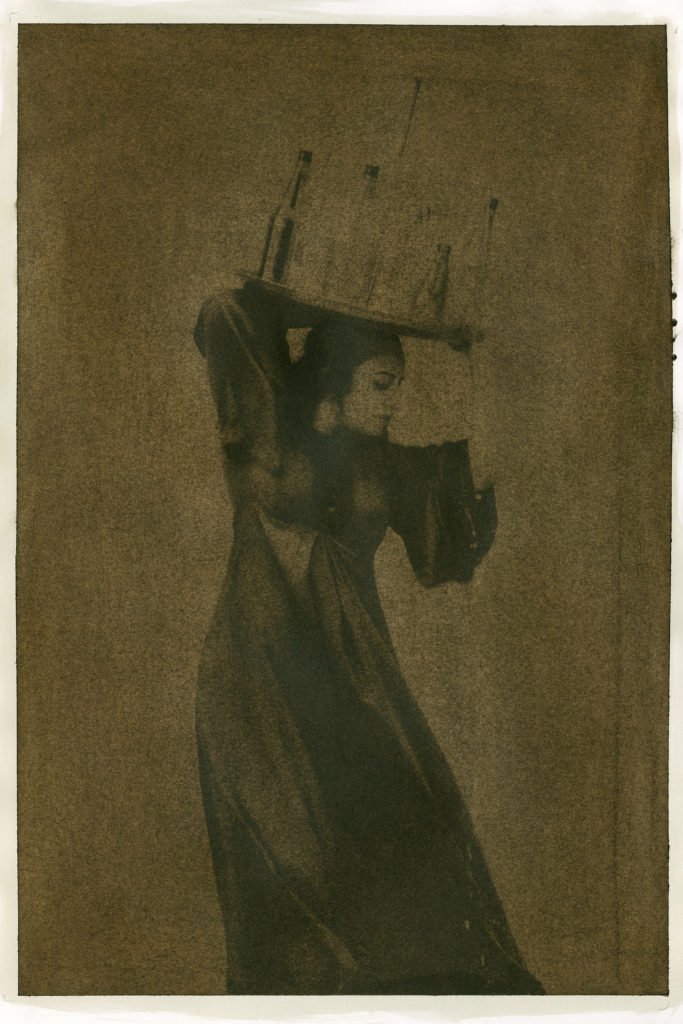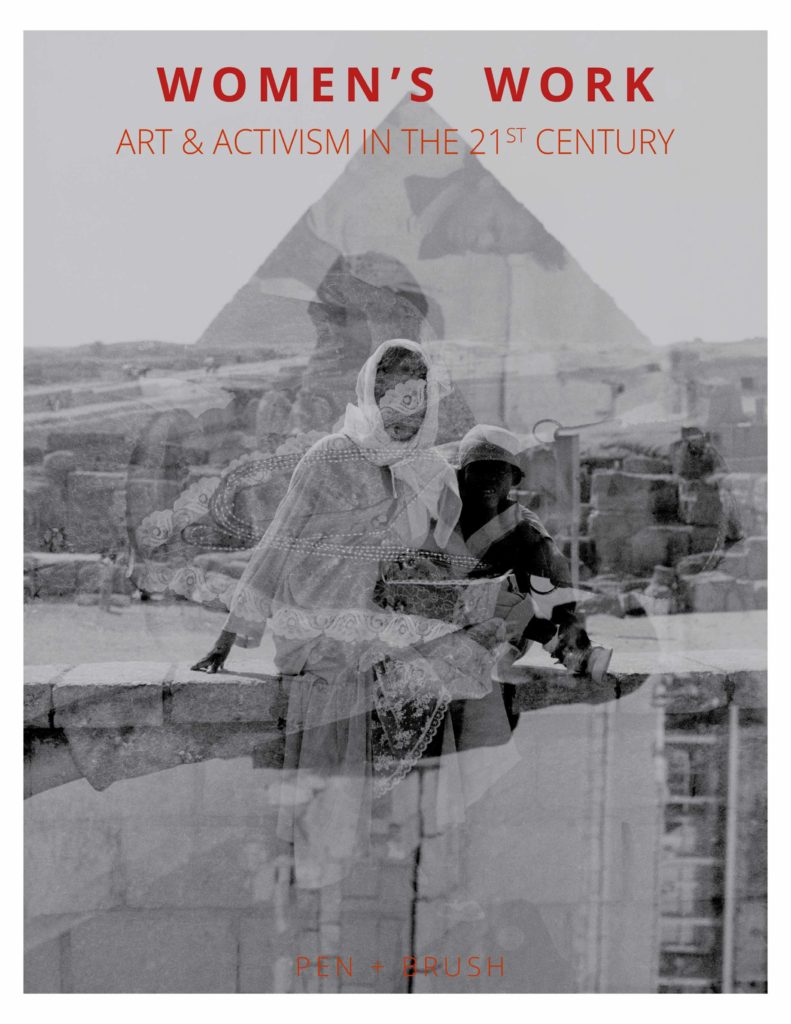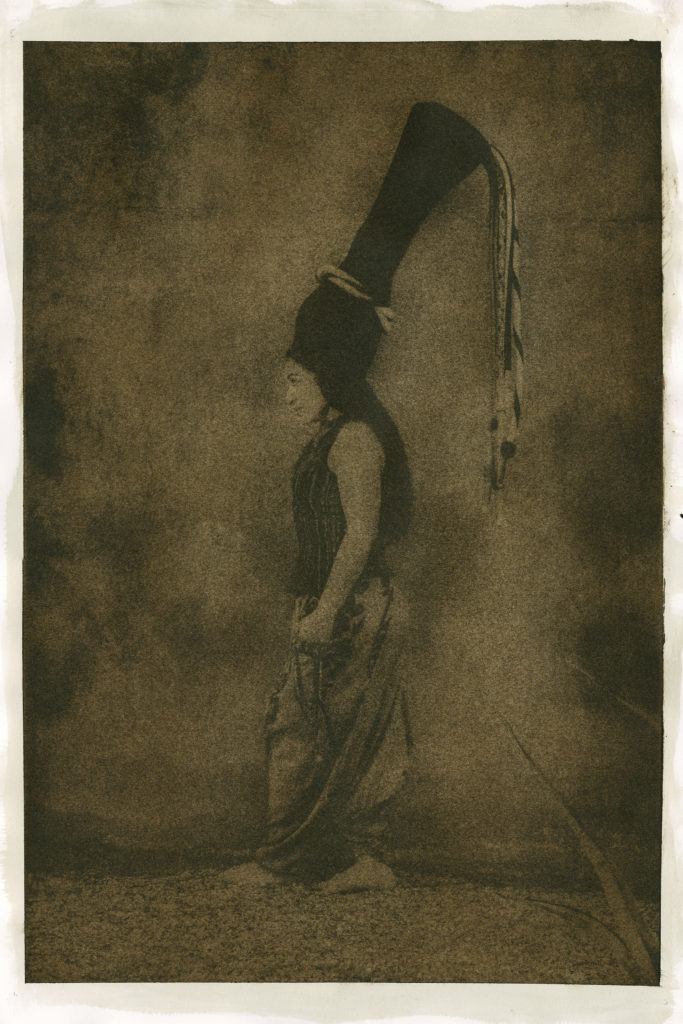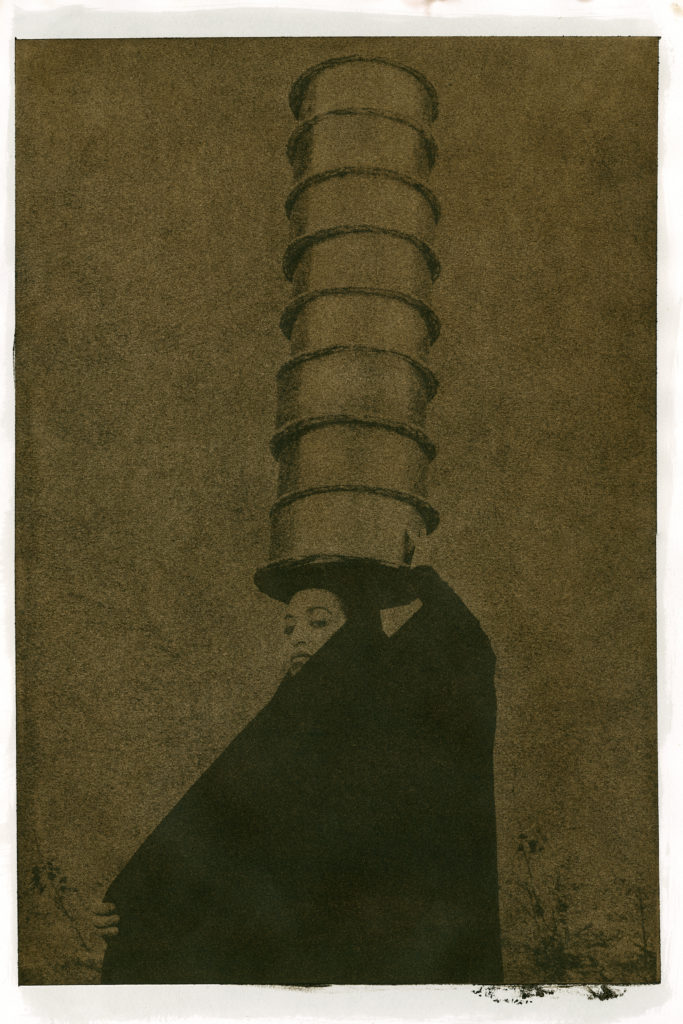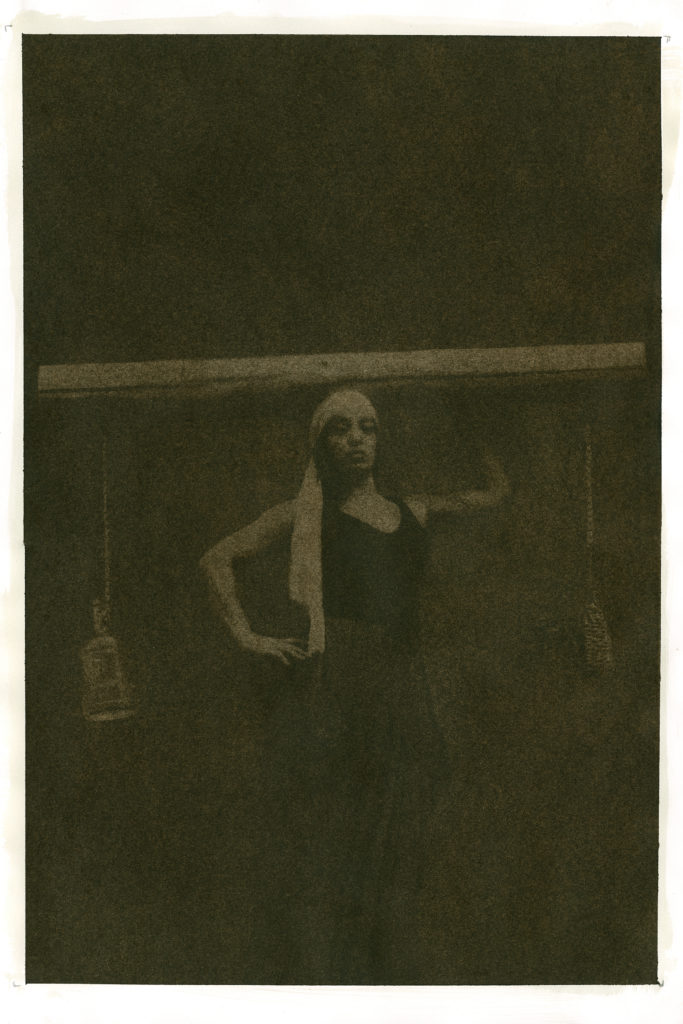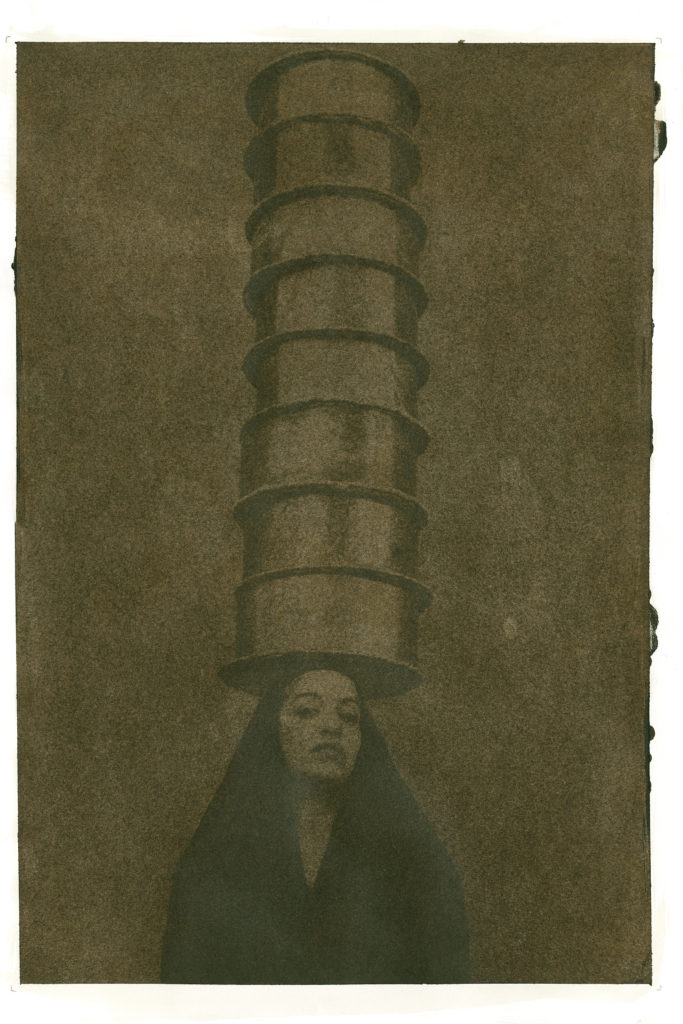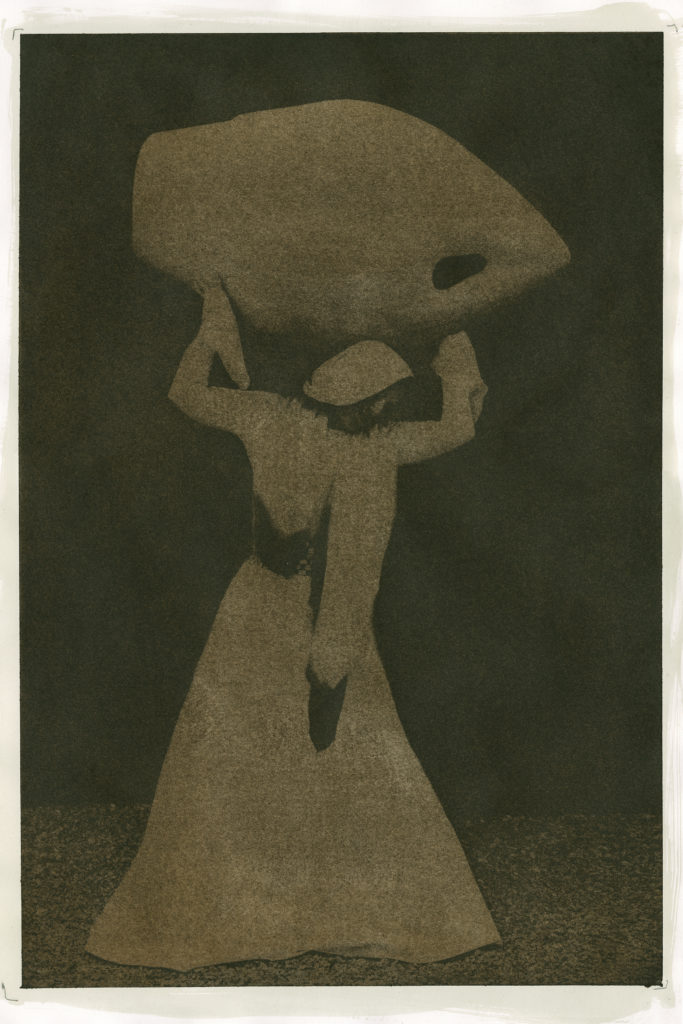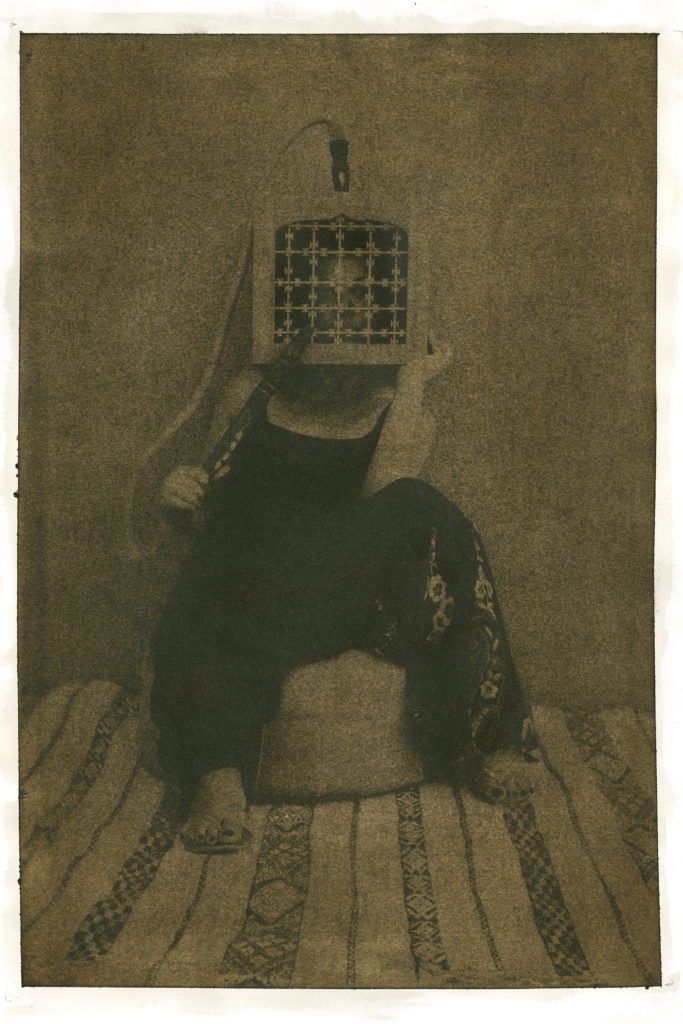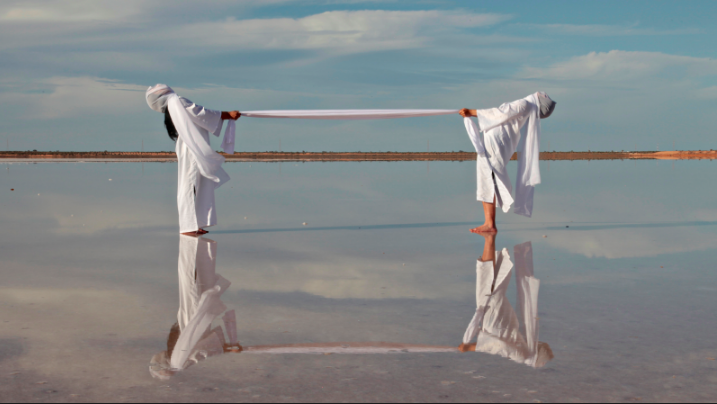Sama Alshaibi: Strength as a Constant
Marjana, from the series, Carry Over, 2018. Gumoil on cotton rag. © Sama Alshaibi. Courtesy of the artist. Carry Over was supported in part by a grant from The Arab Fund for Arts and Culture and the Arizona Commission on the Arts which receives support from the State of Arizona and the National Endowment for the Arts.
The true genius of these visually soft works—soft not in context nor content—but in the very medium of print that Alshaibi has chosen to share them in, alluding to the aged, antique, and historic, is that it takes a deeper concentration to read the sheer activist stance embedded within these unabashed, softly beautiful pieces.
BY ISABELLA ELLAHEH HUGHES | SPRING/SUMMER 2019
The Women’s Work Issue coincides with the Women’s Work: Art & Activism in the 21st Century exhibition at Pen and Brush in New York City. On view April 10 – August 2, 2019.
Over the course of a career spanning almost two decades, Sama Alshaibi has covered many themes: Palestinian sovereignty and the Diaspora; war; gender identity within the Arab world; land rights; the Arab Spring; retracing the journey of Ibn Battuta; and the future of water and natural resources.
Central to her practice is the artist-as-activist stance her work communicates via a recurring female protagonist. From photography to video, whether addressing serious issues or the playful, there she is. The unwavering commonality in all her appearances across Alshaibi’s various bodies of work is the protagonist’s strength and self-assuredness in her actions.
Whether questioning gender norms and male, Arab masculinity in her series vs. Him (2011) or commenting on climate change and the scarcity of water in an otherworldly, entrancing video sequence cinematically shot across the deserts of North Africa and West Asia in Wasl (2017), the strength of the female protagonist—regardless of the setting, costume she wears, or suggested era—is the central focus.
In her most recent body of work, Carry Over (2018), a photography series debuting in Women’s Work at Pen and Brush in New York City, the female protagonist is once more on view in a variety of socio-historical gazes. At first, a quick glance of these gumoils (a process and weathered effect that gives photos an instant antique quality) makes it seem as if they are directly out of the late 19th century.
Sheesha (left) and Milk Maid (right) from the series, Carry Over, 2018. Gumoil on cotton rag. © Sama Alshaibi. Courtesy of the artist.
The subtle irony comes upon deeper observation. Woven among images featuring more historic practices of ‘women’s work’—the Milk Maid and the Water Bearer—are more heady subjects such as Justice, Smoke, Sheesha, Marjana, and Gamer Stack. These directly counter the Orientalist, voyeuristic gaze rampant in 19th and 20th century photography of women from West Asia and North Africa, no doubt assumed by French and English colonists and other curious, foreign voyagers-turned-voyeurs.
This region of the world, known as the cradle of civilization, once celebrated strong women in North African and West Asian history by bestowing upon them an almost mythological status. This was before colonialism, post-colonialism, a succession of dictators and foreign government interventionist disasters, and most recently, a rise in religious extremism. Some of these strong, mythical women are referenced in Alshaibi’s Carry Over—the great Scheherazade and Nefertiti amongst them. These easily recognizable women to any moderately and formally educated global audience are masterfully interwoven in the artist’s portrayal of everyday ‘women’s work.’
Justice (top left), Gamer Stack, (top right), Water Bearer (bottom left), and Smoke (bottom right), from the series, Carry Over, 2018. Gumoil on cotton rag. © Sama Alshaibi.
In the more assertive, unnerving, yet inherently enchanting gumoils, there is an embrace yet contradiction to all that we think we know about women through visual culture transmitted over centuries—from odalisque paintings, to early photography, and more recently, photojournalism and 21st century digital media outlets. Our senses are quickly bombarded with the familiar, reinforcing what we think we know about the women from this region, their place, and their history.
The true genius of these visually soft works—soft not in context nor content—but in the very medium of print that Alshaibi has chosen to share them in, alluding to the aged, antique, and historic, is that it takes a deeper concentration to read the sheer activist stance embedded within these unabashed, softly beautiful pieces.
In Smoke, the woman is entrapped within a mashrabiya box—a recurring motif in architecture from North Africa and West Asia, romanticized as much as the headscarf and hijab and more specifically, the women hidden behind these barriers. Confidently looking behind the mashrabiya-screened box, the female protagonist, almost jauntily puffs away, daring the viewer to question if she is anything but in charge and control of their experience and subsequent perception of her.
Equally arresting is Justice, where once more, the female protagonist, this time with her face clearly seen, gazes directly at the viewer. On her shoulder is a scale of epic proportions, as if she is questioning the historic injustices of women, but also history, and the realities of the present that impact everyone living in Alshaibi’s homelands—broken governments, the lack of the most basic resources such as water, and shaky policies on human rights and women’s rights.
Screenshot from Wasl (Union), from the project, Silsia, 2017. © Sama Alshaibi. Courtesy of the artist and Ayyam Gallery.
Over the past few years, Alshaibi has masterfully moved towards embracing a sense of mysticism and a welcoming softness to her charged, artist-as-activist works, beginning with Silsila (2009 – 2017) and its corresponding video, Wasl (2017). Alshaibi’s ingenuity, shown here in Women’s Work, to play with the comfortable and familiar and reworked with a clear message, is the culmination of the direction her practice has been moving towards. Mabrook.
♦
Isabella Ellaheh Hughes’ career spans the arts, culture, agriculture, and entrepreneurship. She is the founder and Director Emeritus of Honolulu Biennial Foundation (HBF) and President and co-founder of Shaka Tea. A frequent juror in the arts and contributor to exhibition catalogues and publications, she has written for ArtAsiaPacific, Frieze, Harper’s Bazaar Art Arabia, Barjeel Art Foundation, Singapore Art Museum, Aga Khan Museum, among others. She is also the editor of the monograph Sand Rushes In: Sama Alshaibi (Aperture Foundation). Hughes sits on the board of HBF and the Hawai’i Technology & Development Corporation, and is an advisor for the Terasaki Conservancy.
OF NOTE Magazine is free to readers, free of advertising, and free of subscriptions—all made possible by generous supporters like you. Your tax-deductible gift will help us continue to feature innovative and emerging global artists using the arts as tools for social change.
OF NOTE Magazine is a fiscally sponsored organization of the New York Foundation for the Arts, a 501 (c) (3), tax-exempt organization. All donations are 100% tax-deductible to the full extent of the law.

